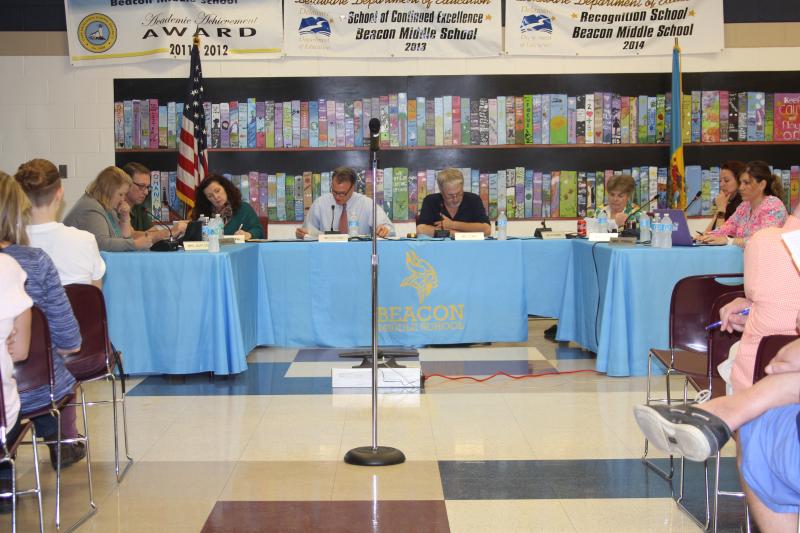Gov. John Carney's budget reset Cape Henlopen School District by about $2 million.
The new budget proposes to shave $37 million in school spending for all school districts by reducing state funds or shifting costs to local districts. Cape's share comes out to $1.9 million, said Cape Henlopen Business Director Oliver Gumbs.
Unlike some districts, he said, Cape has reserves that can cover its anticpated $1.9 million in state funding cuts. Gumbs said the district has $3.7 million in reserves that could offset costs, but the money may not last long.
“We are in a lot better position than other districts because of the way we've managed our budgets,” he said. “We can lean on reserves, but only for so long.”
Among the education cuts, Gov. Carney's budget calls for cutting $1.1 million from the Education Sustainment fund. Money from the Education Sustainment fund helps support teachers and staff. In order to recoup those cuts, Gumbs said, Carney is allowing districts to raises taxes without voter approval through a match tax.
Cape Henlopen has five match taxes that it uses to obtain local funding to work in concert with state funds for a common purpose, according to the district's FY2017 tax rate proposal. There are match taxes for minor capital improvement, technology, extra-time programs, and reading and math resource teachers. The technology match is the only one that requires voter approval. The current rate is about .03 cents per $1,000 of assessed property for a total local share of about $475,000.
Gumbs said he did not know if the state's allowable match tax would be a one-time increase or permanent. Gov. Carney's office did not respond to a question about whether the match tax increase would be permanent.
“It is anticipated that the increase would be permanent, but we will not know all the details ... until the final state budget is approved,” he said.
For now, Gumbs said, Cape has balanced its budget despite the $1.1 million state cut. “We have to make cuts or absorb it without new revenue from a match,” he said.
Until the state finalizes its budget, Gumbs said, there is a lot that could change. The state could reinstate the $1.1 million money or the money could be tagged onto a county tax for collection, Gumbs said. And the board could still impose a match tax if they choose, he said.
He also said that the district does not intend to cut teachers through a reduction in force, commonly known as a rif. In 2014, district voters approved construction of a new school and also agreed to pay for the staff to run it.
Superintendent Robert Fulton said staff for the new school will cost about $2 million, but the amount is covered by a 17-cent tax rate increase that voters approved for operating expenses. “It really helps us,” he said.
Although more staff will be hired for the new school, Gumbs said the district continues to review current staffing to maximize resources and meet goals. “We have been assessing vacancies due to retirements and what will be the best utilization going forward,” he said.
Board President Andy Lewis said he was disappointed legislators who are paid to make decisions are passing decisions on to local, unpaid board members.
“If I vote to increase a match tax, when I come up for election next, I will be defeated by someone who runs under the statement 'I will repeal the match tax, and I will not raise taxes under my power,'” he said. “And shortly, we will have school boards that don't care about the students. They care about the tax rate. And I have a problem with that, that our legislators think that is the right way to go.”
Fulton said there is still a lot that can change, and the district is keeping tabs on the state budget process.
“Once the state knows what it's doing, we'll have more concrete information,” he said. “If we dip into reserves this year, it may be it. We can't do that every time.”
Cape Henlopen match taxes
• The minor capital improvement match tax is set annually by the school board in order to provide a 40 percent match to state funds. Money is used to pay for facility repairs or improvements that can be paid for without a major capital improvement referendum. For FY2017, Cape's local share was about $240,000 for a total of about $620,000.
• An extra-time match tax provides a 30 percent local match for before- and after-school programs. The local match is voluntary, and the district receives state money with or without a local match, according the tax rate report. The FY2017 budget listed $180,000 paid locally.
• A match tax for reading and math resource teachers – known as Minner teachers because the program began under Gov. Ruth Ann Minner's administration – costs the district $400,000 for 11 teachers. This covers local salary and benefits and is 30 percent of the total cost. The state pays the remaining 70 percent for Minner teachers.
• The technology match is the only one that requires voter approval. It was created in FY99 to provide money to maintain and replace technology. The current rate is about .03 cents per $1,000 of assessed property. The school board can reduce or eliminate the technology match tax at any time, but cannot assess at a higher rate without approval of a local referendum. The technology tax raised about $475,000 for FY2017.
Source: Cape Henlopen School District FY2017 Tax Rate Proposal
Melissa Steele is a staff writer covering the state Legislature, government and police. Her newspaper career spans more than 30 years and includes working for the Delaware State News, Burlington County Times, The News Journal, Dover Post and Milford Beacon before coming to the Cape Gazette in 2012. Her work has received numerous awards, most notably a Pulitzer Prize-adjudicated investigative piece, and a runner-up for the MDDC James S. Keat Freedom of Information Award.





















































